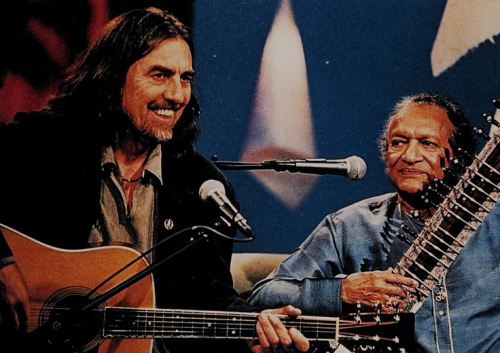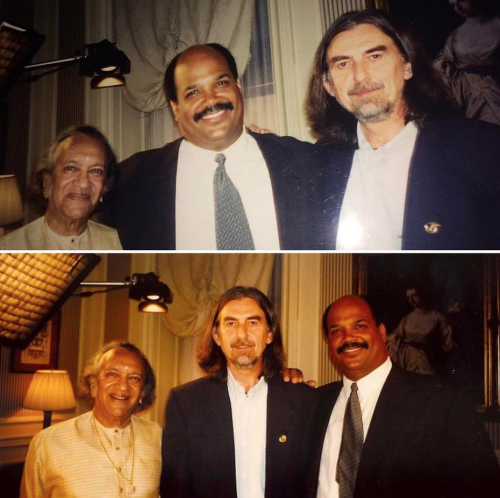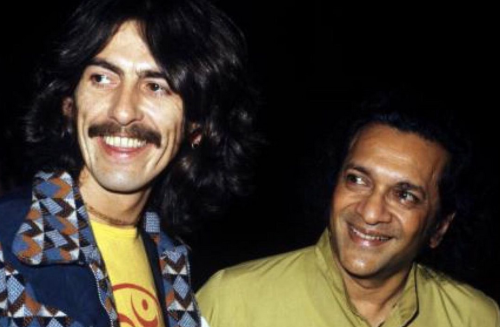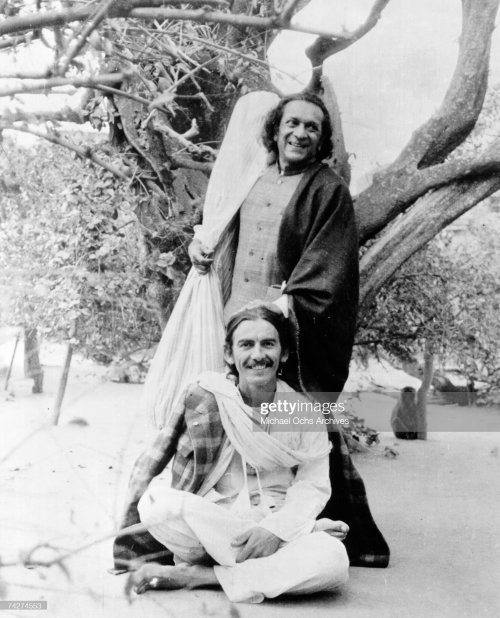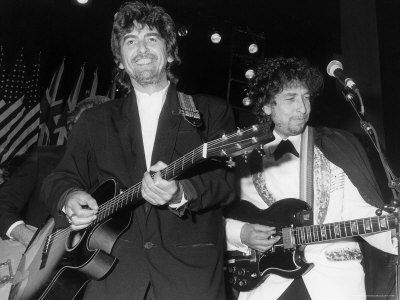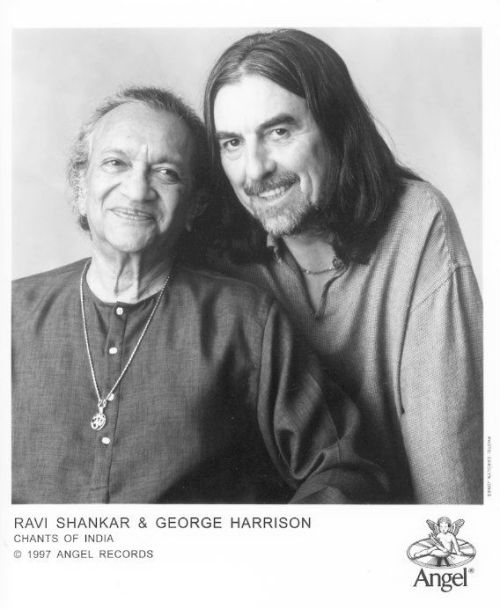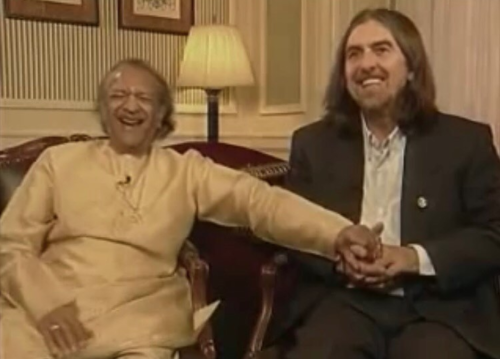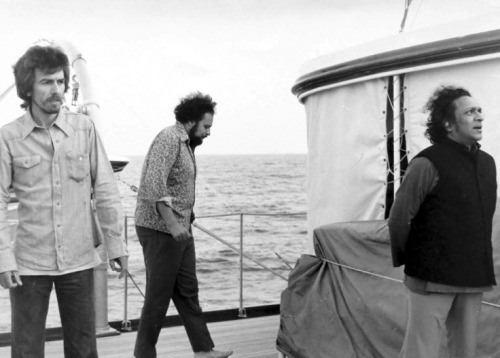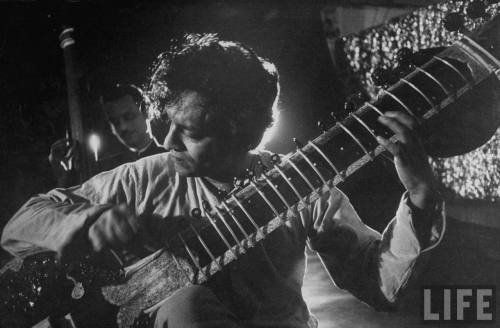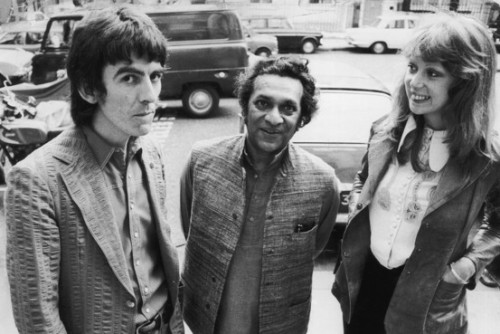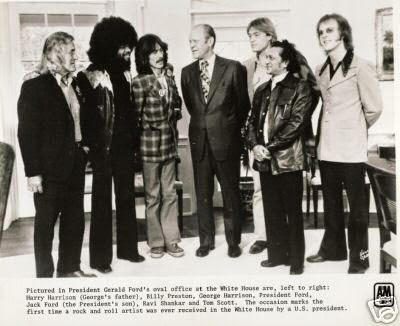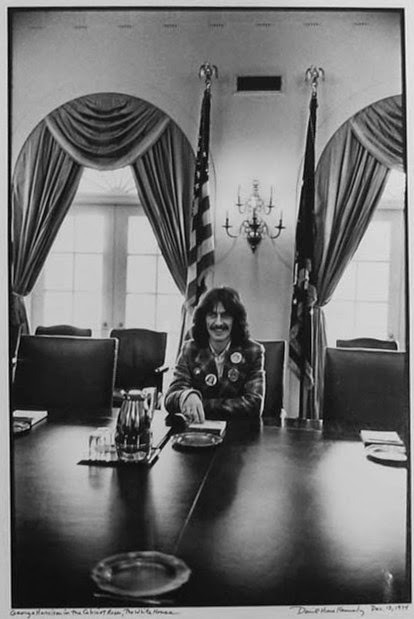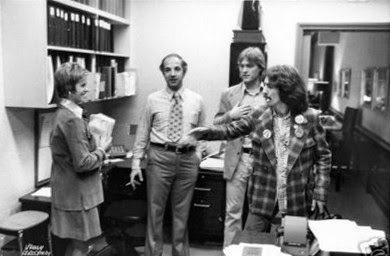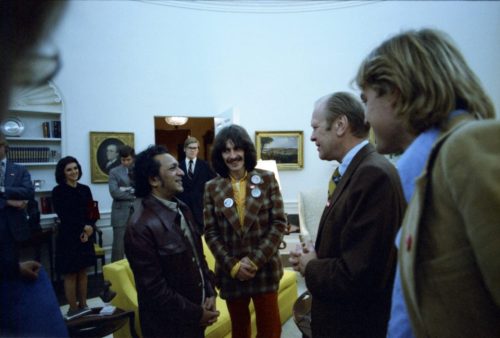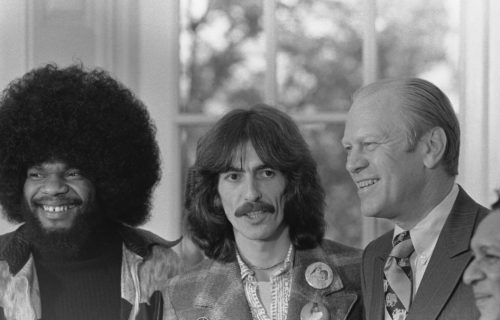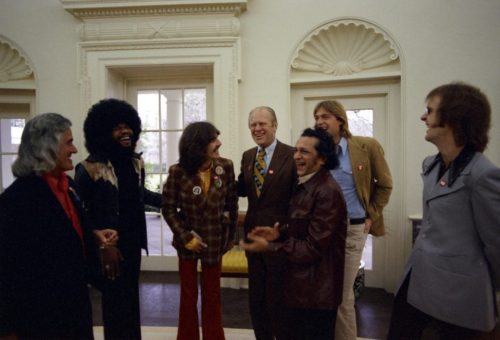#ravi shankar
George Harrison and Ravi Shankar appearing on VH1 for an interview conducted by John Fugelsang, 1997. Photo by Marc Bryan-Brown/Corbis Outline.
“If you want to know anything in this life, you just have to knock on that door — whether it be physically on somebody else’s door or, which I was lucky to find, is through meditation. It’s all within. Because if you think about it, there isn’t anything — I mean, in creation, the whole of creation that is perfect. You know, there is nothing that goes wrong with nature — only what man does, then it goes wrong.
But we are made of that thing, the very essence of our being, of every atom in our body, is made from this perfect knowledge, this perfect consciousness. It superimposed on that is through, if I can use that word, the tidal wave of bullshit that goes through the world. So we’re being barraged by bullshit. But not only that, the way the world is structured or the way creation is structured, we have duality which says: yes/no, good/bad, loss/gain, birth/death, and it’s this circle that you get trapped in. It’s like the Memphis blues again. And that’s the hardest thing to understand: what is causing both of these things? What is causing day and night, good and bad? It’s all the cause and this is the effect. I mean, we’re getting really transcendental here, but… our physical being is really, only a very, very subtle level it’s just like the sap in a tree is the sap and it runs throughout all parts of the tree. It’s like that. Our bodies are manifested into physical bodies but the cause, the sap, is pure consciousness, pure awareness. And that is perfect knowledge, but we have to tap into that to understand it. And that’s really why for me this record [‘Chants of India’] is important because it’s another little key to open up the within, for each individual to be able to see it, and turn off… ‘turn off your mind, relax and float downstream.’” - George Harrison, VH1, 1997 (x)
Post link
Mark McEwen with George Harrison and Ravi Shankar, May 1997; photos courtesy of iammarkmcewen.blogspot.com, and © Mark McEwen.
“We discussed Ravi’s music, his new album [Chants Of India], why George thought it was so important, and then came the moment when I brought up the subject I wasn’t supposed to bring up. ‘You were in the Beatles, the biggest band in the world,’ I said. 'You met kings and queens and talked to movie stars and captains of industry. What was it about this man that made you stop?’ George’s eyes twinkled as he answered. 'We’d met everybody and hung out with everyone and all kinds of people told us we were this and we were that. Truth was, I was tired of all of it and then this little man (and there he turned and smiled at Ravi) came into my life and made it worthwhile again.’ He talked about how Ravi knew very little of who the Beatles were. George talked about how special and unique Ravi was. He talked of how Ravi taught him to see the world in a totally different way. And more.” - Mark McEwen, iammarkmcewen.blogspot.com, 23 August 2015 (x)
Post link
Clip from The Southbank Show, 1997.
“[After a final mixing of a track for Chants of India one] evening [George] came and embraced me with tears in his eyes and simply said, ‘Thank you, Ravi, for this music.’ His emotion meant so much to me, and my eyes filled with tears too.” - Ravi Shankar, Raga Mala(1997)
“I like producing Ravi’s music, because for me it’s educational as well as a joy to work with. It’s actually soothing to your soul, and it helps you to focus or transcend.” - George Harrison, Raga Mala(1997)
“It’s something that I believe in, and I think it’s a benefit if people, during the day, you know, everybody gets stressed out, and this music is particularly inclined to calm you down. It’s an antidote to stress.” - George Harrison, CBS This Morning, 12 June 1997
Ravi Shankar: “He is like a son to me, I mean [laughs].”
George Harrison: “Sometimes I feel like his dad as well, though. [laughs] He can be… Well, you see, with my past, with The Beatles and stuff, we were thrust heavily into the music business, whereas Ravi was, you know, doing his performances in the classical context. And so in some respects, I’ve been able to try to help him or protect him from a vicious world, you know, in terms of contracts or different things like that. In that respect I feel almost like — you know, I have a kind of guardian type of attitude toward him. But most of the time I just feel like friends, and, you know, we just feel like kids really. It’s just our bodies that are old. Inside we’re, like, six years old.” - The Southbank Show, 1997 (x)
Ravi Shankar and George Harrison, 1966; photo courtesy of Indian Express.
“‘You revered Ravi,’ [Olivia Harrison] says of the great man. ‘He carried with him that great tradition, but he was also a very modern man and had a great sense of humor.’
Partly recorded in India and partly at Harrison’s Friar Park home in Henley-on-Thames, Olivia recalls the recording sessions [for Chants of India] well. ‘Ravi was very specific about the mantras and how they were recorded and orchestrated and George really wanted people to understand the vibrations of those chants was beneficial to their well-being.’
The track on her [Songlines] playlist is a particularly poignant choice. ‘At the end of his life George said to me that all he could listen to was “Sarve Shaam,”’ Olivia remembers. ‘After all the sounds and sights and tastes you experience over a lifetime, it came down to the purity of “Sarve Shaam.”’ The piece was also performed as the opening blessing at the Concert for George memorial, held at London’s Albert Hall in 2002.” - Songlines, June 2018 (x)
Post link
George Harrison and Ravi Shankar, 1974. Photo: Picture-Alliance/Photoshot/dpa.
“‘Mangalam’ came to me while I was walking in Friar Park, George’s place, where we were recording. I was looking at the trees and the sky, and feeling very elated all of a sudden, wishing everything should be good for everyone, and it just came to me.” - Ravi Shankar, Rolling Stone, 15 May 1997
“Steve Murphy, the president of Angel Records, had heard some songs that were similar to material on ‘In Celebration,’ a Ravi retrospective that I had helped assemble last year. He suggested we go in to the studio to record more. This music, which is based on ancient Vedic chanting, I very much enjoy. And, of course, it gave me an opportunity to work with Ravi, so it made perfect sense. […]
In a way it represents the accumulation of our ideas and experiences throughout our 30-year relationship. But to put it into a slightly more commercial aspect, the record label asked us to do this and that would never have happened 15 years ago. Because of the fact of multiculturalism has become more accepted, and more people are interested in what this music offers, this project has become more commercially viable. And this music is very close to me, this is something I very much wanted to do. I actively read the Vedic scriptures and I’m happy to spread the word about what this project is all about. People also need an alternative to all the clatter in their lives, and this music provides that. Whether it’s Benedictine Monks chanting or ancient Vedic chants, people are searching for something to cut through all the clatter and ease stress.” - George Harrison, HITS, 1997 (x)
Post link
Ravi Shankar and George Harrison, India, 1974; photo by Michael Ochs Archives/Getty Images.
Q: “So the relationship has had a powerful impact upon both your lives?”
George Harrison: “In one way, it’s kind of given me a life. Because if you don’t know who you are and where you’ve come from and where you’re going, really, what is life? You can have all the money in the world and all the glory. But if you don’t know what is the point, then your life is empty. So, in that respect, Ravi — not just Ravi, but he was the main ingredient — patched me into the Vedic tradition. And from that I’ve learned all these things about yoga, about meditation, about what it is, about what are we doing here, about what is the goal. I’ve come to understand incredible stuff, just through pursuing that. Without it, I’d just be a boring old fart.”
Ravi Shankar: “To me, George is, I don’t know how to describe it, a son, a friend, someone very dear, and I love him very much. He has given me so much love and respect that my heart is full of it.” - Los Angeles Times, 10 May 1997 (x)
Post link
George Harrison and Bob Dylan onstage at the Rock and Roll Hall of Fame awards ceremony in January 1988; photo by David McGough.
“In music, it breaks down into the people who have more sort of a worldly consciousness, and that’s why I’ve always been with Ravi Shankar because he’s bringing, particular in the West, he’s bringing something obscure and creating an audience, and through his audience then he’s giving them something extra which, you know, that something which people who appreciate can get into, you know, it’s a whole other train of thought that comes from the music. You know, in simpler terms, those people are like people who just convey in their music some sort of sincerity. Like I’m a big fan of Smokey Robinson just because musically he’s so sweet, you know, he’s so sweet he makes you feel nice, he makes me feel good. Whereas a lot of music I listen to which is popular music which just makes me uptight, you know, even if I’m not listening too closely, just the sound of it and the whole thing, and the repetition, you know, the boring sort of repetition of how it’s playing. I always have been a fan of Dylan’s, and I think I always will be, because somehow, I don’t know, Dylan has always managed to upstage everybody, you know, when it comes down to being aware of being able to put into words… You know, I mean, we can feel and see a lot of things but when it comes down to writing a tune and being able to communicate this through words, I mean he’s very good at being able to put words down.” - George Harrison (on musicians he admired, 1975), KMET, 1975 (x)
Post link
Ravi Shankar and George Harrison, 1997; photo by Carolyn Jones, © 1997 Angel Records.
Q: “This new recording is the latest product of a relationship that stretches back more than 30 years. Do you remember what it was like in the beginning?”
George Harrison: “It’s almost as though it was scripted, and all I did was follow the script. When I first got a recording of Ravi’s, a World Pacific recording, I put it on, I played it, and inside of me I had an instinctive feeling that I was going to meet him, which I did. And all the other things have been a byproduct of that relationship. I went to India to learn some music with Ravi, but my main quest was that I wanted to know about the yogis. But Ravi was like my input into it. Through him I was able to hear the best music, buy the best incense, read the best swamis, meet the best people. I was very, very fortunate to become friends with him. And consequently all the goodness that I feel has come to me in my life is a direct effect of being plugged into that Indian-ness or Indian tradition or whatever that I gained through Ravi.”
Ravi Shankar: “In the beginning, when we met back in 1966, I found him very immature, naturally, because he was very young then. But still he had tremendous passion in wanting to know about India, Indian yogis, Indian music, Indian philosophy, Indian food and all that. And through the years, I thought, you know, this too shall pass. But I introduced him to this book, ‘Autobiography of a Yogi’ by Paramahansa Yogananda, and that put him on a serious approach. Then he tried himself with Maharishi Mahesh Yogi and the Krishna people, but he always came back to me through music. In fact, it is mainly through music that I pushed him further and further, and today I find him to be so much into it, more than ever before — not in a superficial manner, but deeply into it.” - Los Angeles, 10 May 1997 (x)
Post link
Ravi Shankar and George Harrison (in a screenshot from a 1997 interview).
Q: “Westerners have been fond of Indian music since the big breakthroughs of the ‘60s — primarily via Ravi’s music — without necessarily acknowledging or even being aware that it is a classical music based upon a complex system of knowledge and performance. What do you feel are the elements that make this sometimes dense form of expression so accessible to Western ears?”
George Harrison: “You don’t have to know all about it, you just have to be open to it — to the rhythms and the sounds of it. You don’t have to know exactly how they do it. Which in some sense, I guess, is what led to the bastardization of Indian music, which, I suppose, I started back with [adding sitar to Lennon/McCartney’s] ‘Norwegian Wood.’ But, you know, all I was doing really was trying to get the sound. You can’t resist the sound of the instruments, you can’t resist the sound of Indian classical music if you’re ready to surrender to it and not judge it. Just accept it and listen to it. Which is why I got into it. It was just overpowering, in a transcendental way.” - Los Angeles Times, 10 May 1997 (x)
Post link
“Raga” director Howard Worth with George Harrison and Ravi Shankar, off the coast of Cannes, May 1972. Phots: Ventura County Star.
“You know, though, the film [Raga] very nearly never made it. We had to stop production for 9 months because we ran out. The only reason RAGA finally became a reality is due to only one person — George Harrison. There was a time when most of the film was completed and I was in terrible financial straits. I couldn’t really complete the film and I didn’t know where to turn. I was calling up all the distributors and screening, and they were all telling me, It’s a great film but it’s different and what are we going to do with it?’ Now, George Harrison is in the film, briefly, and we had just that relationship — doing the film. He did his piece and that was it. But out of desperation I called him to see if he could pull any weight with the distributors. He came over and saw the film, and then he just got up and walked out. I figured it was all over, but he called the next morning and said, ‘What do you need?’ I said, ‘I need distribution.’ And he said, ‘You need money to finish it. The film really moved me; that’s why I left. What you’re trying to say is what matters.’" - Howard Worth, interview conducted by Stephen T. Smith, Filmmakers Newsletter Summer 1972: Vol 5 Issue 9-10
“In 1968, I did a documentary film with Ravi Shankar called ‘Raga,’ and in that film, Ravi said, ‘Music is the only language I really understand, for I believe in Nada Brahma, meaning The sound is God.’ All music, whether it’s deep within the cosmos, or it becomes more gross in the physical world, is still based on the subtlest manifestations of God. I feel like Ravi does about music, and I want to see that sound.” - George Harrison, Billboard, 5 December 1992 (x)
Post link
George Harrison, Ravi Shankar, and Pattie Boyd at the preview of the Raga film circa 1972.
Post link
George Harrison, Ravi Shankar, and Pattie Boyd at the preview of the Raga film circa 1972.
Post link
George Harrison at the White House
On December 13, 1974, keyboardist Billy Preston, sitarist Ravi Shankar, saxophonist Tommy Scott, manager Denis O’ Brien, publicity agent Michael Sterling, and George Harrison’s father, Harry, all accompanied the former Beatle to the Ford White House. Harrison and company were in the midst of their 1974 North American tour and were performing in nearby Landover, Maryland, on December 13.
Jack Ford said he invited George and friends to the White House because he had been invited backstage at the Salt Lake City show. "They were so hospitable to me I wanted to return the favor,“ he said.
A lunch of vegetables and beef was served in the solarium while George’s Dark Horse album was played in the background. It was reported George stuck to the vegetables.
Jack and his sister Susan acted as tour guides as the entourage viewed the White House rooms. In the East Room, Harrison and Preston sampled a few bars on the 1938 Steinway piano situated in the historic room. President Ford met briefly with them for about 15 minutes in the Oval Office. Politics was apparently avoided that day. After the meeting, Harrison stated, “I didn’t ask him [Ford] about Bangladesh or anything else political … I didn’t want to bug him.”
Tom Scott recalled they were brought to a conference room outside the Oval Office to wait until the President became available. "We walked into the presidents’ conference room with the oval table and the chair and signs saying, ‘Secretary of Defense,’ 'Secretary of this and that’ and we sat down in the chairs, clowning around.” Scott went on to say that George and Billy did some jamming on a piano in the room, but then it was time to meet the President.
As Harrison’s entourage was leaving the office, Jack told his father, “I promised George a WIN (Whip Inflation Now) button.” When one could not be immediately found, the president sent appointments secretary Terry O’ Donnell to find one. In return for the WIN button, Harrison gave the president an “Om” mantra pin representative of Harrison’s interest in Eastern spirituality.
Harrison would remember Ford as quite amiable both in the immediate aftermath of the visit as well as in his 1980 autobiographical work, I Me, Mine. Harrison confessed that he felt “good vibes about the White House.” On whether the president was a follower of Harrison’s musical output, Harrison admitted shortly after the meeting, “I don’t think he’s too familiar with my music.” Later that evening at the Capital Centre, Harrison was seen onstage wearing the pin given to him by President Ford.
Post link

